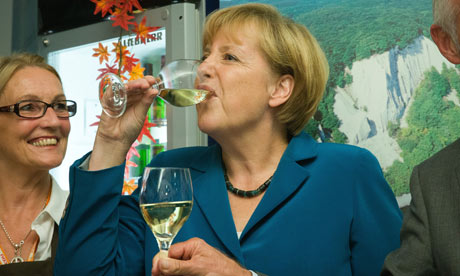German chancellor on course to overtake Margaret Thatcher as longest-serving female leader after historic victory
Kate Connolly and Philip Oltermann
The Guardian
September 23, 2013
Angela Merkel was basking in a historic third-term election victory in Germany on Sunday night, having led her conservatives to their best result in more than 20 years.
Merkel’s Christian Democratic Union and its sister party won 41.5% of the vote, with analysts calling the win a personal victory for the 59-year-old, who is now on track to overtake Margaret Thatcher as Europe‘s longest-serving female leader.
Merkel’s performance was compared to that of conservative chancellor Konrad Adenauer, who was the last chancellor to secure a Bundestag majority without need of a coalition partner since 1957. After a campaign that concentrated almost solely on Merkel’s personality and solid leadership in times of economic turmoil but was thin on detailed policy, she came within a whisker of obtaining an absolute majority, falling just five seats short.
Final results gave the CDU/CSU 311 seats, the Social Democrats 192, the Left party 64 and the Greens 63.
The historical dimensions of the election were clear, with Merkel set to become just the third postwar chancellor to secure three election wins, after Adenauer and Helmut Kohl, who brought her into the party as an inexperienced and gauche 35-year-old.
She has also bucked the European trend by becoming the only leader in the eurozone, whether from left or right, to be re-elected since the snowballing of the euro crisis in 2010. Out of 17 countries in the eurozone, 12 governments have fallen, indicating how protected under Merkel’s leadership Germans feel from the crisis.
In a result that was closely watched across Europe, Merkel crushed her opponents – and, indeed, some of her allies.
Her coalition partner, the FDP, fell out of parliament for the first time since it was formed after the second world war, securing just 4.8% of the vote. All other parties – with the notable exception of the eurosceptic Alternative für Deutschland – lost ground.
The French president, François Hollande, was the first world leader to offer his congratulations, but the wider implications for Europe, austerity, the euro crisis and David Cameron’s hopes of repatriating powers from Brussels were less clear.
Merkel will still have to rely on a coalition partner for a secure governing majority. Without her former liberal allies, she might now have to turn to the SPD, which is firmly opposed to Cameron’s ideas of wresting powers back from the European Union.
The scientist and pastor’s daughter who grew up in communist East Germany appeared to her party faithful in Berlin just 45 minutes after the first exit polls were released, a clear indication of the confidence there was in the win.
 Daily Stormer The Most Censored Publication in History
Daily Stormer The Most Censored Publication in History



